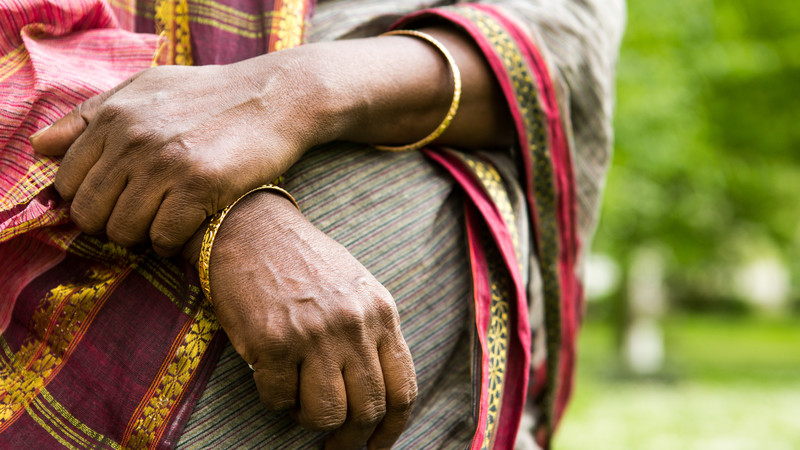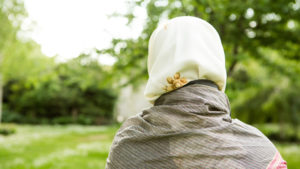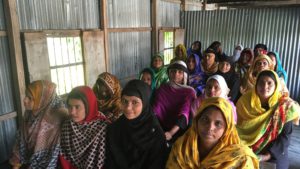Standing up for migrants on the move in Bangladesh

Jess, a member of the Asia and Middle East team recently met with Pakhi * a former migrant worker from Bangladesh who now helps other migrants to protect their rights.
When I met Pakhi, she described her experience of migrating to Kuwait as a young woman to take up employment as a domestic worker.
Pakhi explained, “I went to Kuwait to start sending money back to my elderly mother in Bangladesh and save up for my future. I worked in Kuwait for more than 2 years and I was forced to work around 20 hours a day by my employer. I was paid for only 6 months work and my passport was confiscated. I was confined to my employer’s house and I wasn’t allowed to contact my family back home”.
Share the Journey: sign our petition
Last month, Pakhi and CAFOD’s partner Ovibashi Karmi Unnayan Programme (known as OKUP) – a community based migrant workers’ organisation that works in Bangladesh visited the UK. OKUP and Pakhi met with the UK government to raise awareness of Bangladeshi migrant workers’ rights and to call for an end to modern day slavery.
Pakhi told me: “I am sharing my experience in different places so that governments and others are aware of these issues and take initiatives to end it. I want to stop this kind of abuse for women and I will continue working until it is stopped.”
Facing violence and Intimidation
Nearly one quarter of Bangladesh’s workforce is unemployed or underemployed, forcing 800,000 people to leave Bangladesh each year to find work overseas. About half of these migrants travel legally and the other half migrate through unofficial channels. Although Bangladeshi laws and policies encourage safe migration, migrants often face violence and intimidation.

Find out more about vulnerable migrants in Bangladesh
Pakhi described her experiences working as a domestic worker in Kuwait to me, “The family worked me like a machine. They didn’t give me enough food and I was abused both physically and mentally. After 27 months of this, my employer told me that I needed to go back home. When I asked for my salary I was told I would receive it at the airport. When my employer dropped me off at the airport, he didn’t give me my salary. I returned home empty handed.”
Female migrants also face stigma and discrimination once they return home. Pakhi told me she couldn’t talk to her family about what had happened to her in Kuwait for fear of rejection.
Instead she turned to the CAFOD’s partner Ovibashi Karmi Unnayan Programme (OKUP), a migrant worker’s organisation who work to protect migrants’ rights.
Helping Refugees to Protect their Rights
Pakhi explained how OKUP supports migrants at all stages of their journey, offering training and other vital support. The training looks at practical considerations when people decide to migrate – such as the risks involved in travelling, how to manage finances, how to adapt to other cultures and health considerations.
Pakhi also told me about her own training role: “I teach [migrants] about different cultures, about the roles of the employers and the acceptable behaviour of the employers so they do not face the same problems that I faced,” she said. “I teach them languages like Arabic, so they can speak with their employer.”

OKUP provides legal assistance to support migrants in cases of human rights violations, trafficking and exploitation. OKUP also helps migrants to reintegrate back into society once they are home, carrying out airport pickups and providing temporary shelter for the most vulnerable female migrants. Staff provide medical treatment and counselling alongside vocational training, so migrants can find skilled jobs in sectors like textiles in the future.
Standing up for migrants
Pakhi says that her experience as a migrant is sadly far from unusual. Many Bangladeshi migrants suffer similar fates. And it is stories like these that have prompted Pope Francis to declare this time a ‘unique opportunity’ for us to press our governments to make global commitments that recognise the human dignity of people on the move.
This year, CAFOD supporters have come together to walk 24,900 miles – the distance around the world – in solidarity with refugees and migrants. But CAFOD’s Share the Journey campaign is not just about raising awareness, it is also about recognising the human stories of migrants like Pakhi.
Share the Journey: sign our petition
* Pakhi has asked us to protect her identity by not using her real name and by not showing her face in photographs taken during her recent visit to the UK.